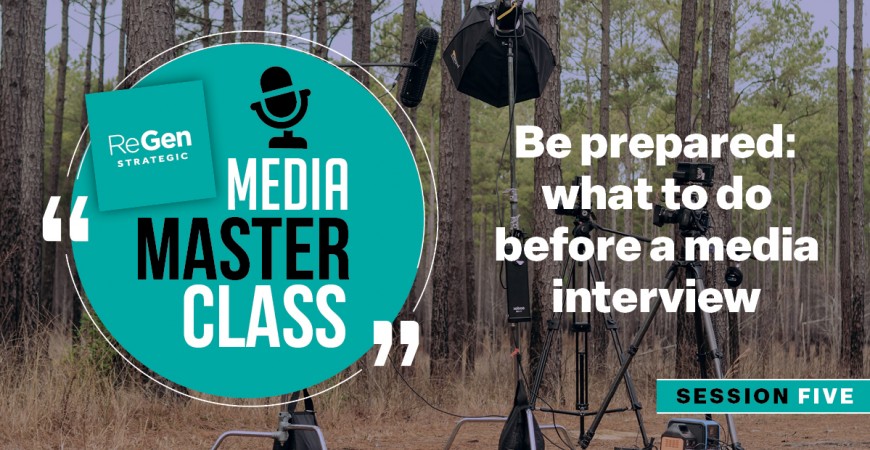With sustainability coming into greater focus in the public consciousness, media interest in environmental, social and governance issues is set to increase as well.
All around the world, journalists will be starting to establish networks of sustainability and ESG experts they can approach for comment whenever there’s a major development in this area, such as the recent publication of ISSB standards or increasing regulatory focus on greenwash.
Being regularly quoted as a subject-matter expert in the media offers a range of benefits, but how you perform in your first media interview will determine whether your number is deleted from a journalist’s phone or saved as a favourite.
To give yourself the best chance of achieving the latter (whether it’s your first time fronting the media or you’re a regular source for journalists), it’s always important to be prepared before a media interview.
If you’re approached by a journalist, there are a few questions you need to ask before agreeing to go on the record. If your organisation has a media protocol in place, your media contact should already have a list of questions to ask.
If not, the first step is to ask what medium it will be: radio, TV, print or online. Depending on the answer, other questions could include: Will it be live or pre-recorded? Will it be over the phone or in person? What’s the angle of the story? Will you be the only talent, or will there be others? What will some of the likely questions be?
It’s important to know what you’re getting yourself into, especially if you’re not yet a seasoned media performer.
The journalist might not be willing or able to answer all of these questions (particularly around likely questions they might ask), but every bit of information you can get helps, so it’s worth asking.
Once you’ve established the details of the media interview and agreed to them, here are a few more tips to help you prepare – no matter what your sort of expert you are:
Brainstorm some possible questions
Journalists often won’t give you the questions beforehand, so think about what you would ask if you were in their shoes, and what your response to them will be. In ReGen Strategic’s media training sessions, we handle this part for you, with our team of former journalists preparing a list of questions they would ask as the media.
Practice
Radio and TV interviews rely on audio and vision, so it’s important to practice your answers out loud (particularly if the interview is live). For TV, you might even want to practice in front of a mirror to help confidence and composure and to be more aware of your body language. Or you could go one further and sign up for a media training session with ReGen Strategic – our program includes simulated media interviews for TV and radio that we record and provide real-time feedback.
Find somewhere quiet and secure
The infamous example in the UK of a child running amok in the background during a live TV interview might have been entertaining, but it could also be pretty embarrassing. Find a quiet place for TV, radio and online interviews, turn off any devices you aren’t using for the media interview and make sure the doors are locked, if possible. With video interviews using Teams or Zoom more common since COVID, it’s also worth spending some time making sure there isn’t anything personal or embarrassing in your background before the interview starts.
Control what you can
When dealing with media, there will always be some unknown factors, so control what you can to put yourself more at ease. Often, the journalist will be able to work with you on where and when the interview will take place. If you get a choice, choose a time when you are not under pressure and a place where you are comfortable. If you’ve never done a live interview before, you may be able to request to pre-record it.
If you’re holding a media conference, decide whether you are going to make a statement first and then open it up for questions, or just start taking questions straight away. If there are going to be multiple speakers, decide who will speak first and what order you will be in. Explain this to the journalists so that the conference runs as smoothly as possible.
Develop key messages
This point is so important that it was the focus of an entire Media Masterclass session a few weeks ago, but it’s worth repeating here. You need to go into a media interview with 3-5 key messages that you want to get across. If it’s a radio interview over the phone, write them down and have them in front of you, but don’t read them word for word, just have them there as a guide.
As with embarking on your sustainability and ESG journey, performing media interviews can be daunting. However, as with making a positive impact, commitment and preparation are key.
For more information about ReGen Strategic’s comprehensive media training, please contact us directly.
 ReGen Strategic
ReGen Strategic